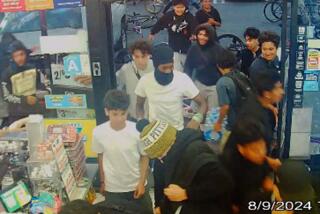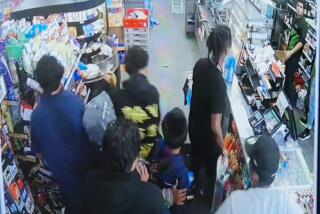Parenting : Reaching for Attention : There is no profile for the typical shoplifter. But one expert says they have a common trait--they are troubled.
- Share via
Having ditched his first-period class, the 14-year-old boy was hanging around outside a convenience store with a few buddies when he decided he wanted some candy. So he went into the store, selected an 85-cent chocolate bar, and--although he had plenty of change in his pocket--walked out without paying for it.
And he got caught.
It hardly qualified as a major heist. But it was a crime. The police were called, and the boy was arrested.
“When the sheriff called me, my heart went ‘boom,’ ” the boy’s father said. “I found my son sitting in the back seat of the patrol car, crying his eyes out.”
Scenes like this happen every day, everywhere, from the priciest suburban enclaves to the grittiest urban neighborhoods. The young offenders are gang members and cheerleaders, class clowns and class presidents. They take everything from expensive clothing to potato chips. And while their motives for shoplifting vary from peer pressure to rebellion to a cry for attention, experts say the best time to intervene is before it starts.
“Parents often wait till something happens before they do their teaching,” said the father of the boy who stole the candy. “This experience caught me way off guard. I should have done more education and talked to my son about good values--before the incident occurred.”
Parents who think that their child is not the shoplifting type may be surprised to learn that there is no such thing, according to Police Officer Sandra Castillo. “There is no typical profile,” she said. “You have the nice kids with hard-working parents, and you have the kids who steal because they have no money, and you have those who do it because they are hardheads.”
But they have one thing in common, according to Marilyn Shore, a Westlake Village psychologist who specializes in teen-age issues: They are troubled.
“You usually don’t see shoplifting in the well-adjusted, involved teen,” she said. “Shoplifting is a way of acting out: If they cannot fulfill their needs in a constructive manner, they do it destructively. And peer pressure during the adolescent years is so strong that if everyone else in their group is doing it, shoplifting may become the thing to do.”
While there are no sure methods to prevent children from stealing, one effective measure, according to Shore, is to get involved in their lives. “In a warm, friendly, caring way, let your kids know you are concerned about what they are doing,” she said. “Take 20 minutes sitting on the kid’s bed with the door shut, and really listen, respond and ask questions. Talk to them about right and wrong. More than anything else, those one-on-one conversations let your child feel your love.”
If parents learn that, despite their best efforts, their child has shoplifted, they should take immediate action.
Talk to the youngster, suggests Peggy Wilson-Jordan, clinical director of Mid-Valley Youth Center, a Van Nuys residential facility for high-risk adolescents. “The kid may be trying to get someone’s attention, or he may be depressed or unhappy and is stealing to fulfill an emotional need.”
Experts stress that it is important that youngsters face consequences for their actions.
“Parents need to give a very clear, calm message that what they did is not OK,” Shore said. “(The children) definitely have to take the merchandise back. If it has already been eaten or used, they have to pay for it or provide some sort of service to the person they have offended.”
The boy who pocketed the candy, for example, made amends--at his father’s insistence--by spending two weekends doing odd jobs at the convenience store.
“He cleaned windows, swept the floor--did whatever the owner told him to do,” the father said. “His friends came by the store, and they knew why he was there. I also grounded him to his room for two weeks. I felt kind of sorry for him, but I also felt it was important to not back down. And I think it worked. There have been no further incidents.”
More to Read
Sign up for Essential California
The most important California stories and recommendations in your inbox every morning.
You may occasionally receive promotional content from the Los Angeles Times.













